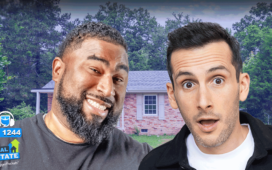Could real estate investing help you reach financial freedom much sooner than you thought possible? Today’s guest had his world turned upside down by one tragic incident, but he was able to quit his W2 job, pivot to real estate, and fast-track his journey to FIRE!
Today, we’re chatting with technology instructor turned full-time real estate investor Keith Nugent. After a skydiving accident rendered him unable to perform his previous job duties, Keith knew he needed a new path to financial independence. Fortunately, he discovered real estate at the perfect time. Taking advantage of the fallout from the 2008 housing market crash, Keith started loading up on rental properties—often buying them for pennies on the dollar. In just twelve years, he had not only achieved his goal of thirty cash-flowing units by 2020 but also added an additional ten units to his portfolio!
Thanks to real estate, Keith now has a career that fully accommodates his disability and will allow him to retire early. In the meantime, he enjoys his newfound financial freedom by traveling the world and spending time with his FIRE-bound friends. In this episode, Keith offers practical tips on how to start investing in real estate—from choosing your market to buying your first rental property and more!
Mindy:
On this episode, a fire Friday of the BiggerPockets Money podcast. We’re talking to someone who was able to flip a bad situation and turn it into an opportunity. Today we’re talking with Keith Nugent, who was forced into disability after a skydiving accident in 2006, after his recovery, Keith realized he could no longer work as a corporate trainer and had to forge a new path in real estate instead. Hello, hello, hello and welcome to the BiggerPockets Money podcast. My name is Mindy Jensen and I am jumping in solo today. There’s a little pun for all of you people who are missing. Scott. He will be back with me soon. As always, I am here to make financial independence less scary, less just for somebody else to introduce you to every money story because I truly believe financial freedom is attainable for everyone, no matter when or where you are starting. And now let’s bring in Keith. Keith Nugent. Welcome to the BiggerPockets Money podcast. I’m so excited to dive right into this interview.
Keith:
Hey, Mindy. It’s good to talk to you.
Mindy:
So Keith, in 2006 you had a skydiving accident that sort of took your life in a different trajectory on a very high level. Can you give us a little bit of background about what happened?
Keith:
Yeah, so I was doing a trick that I’d done a couple hundred times already that season, but there was one variable that was changed that I forgot about, and so rather than landing softly, I pounded into the ground and this happened on a Sunday. I woke up in the hospital on Wednesday with all sorts of broken bones. I had bitten through my tongue and had rattled my brain around. I had a bunch of brain damage. I’ve actually lost, I think 27 points IQ points from before to after the accident.
Mindy:
Did your parachute not open?
Keith:
No, my parachute is open. I was flying it just instead of coming out of the turn just above the ground, I came in out of the turn just below the ground or the ground didn’t move.
Mindy:
It has a habit of not doing that. Gravity is a rough, rough lesson.
Keith:
Yeah.
Mindy:
Wow. So let’s go back to the beginning of your money journey and talk about how your experiences with money as a kid shaped your adult life.
Keith:
Yeah, so growing up I grew up in a standard middle class, middle income, blue collar family. My parents raised my brother and I, we didn’t really know what money was other than they taught us to save. They had a number of shortcomings. My dad got injured when I was eight, and so he was out of work for a year and a half. My brother and I had no idea how that affected the family financially. Looking back now, I can see some big changes that happened during those times, but at the time I was just a happy kid and my parents really emphasized the idea of saving. So every birthday or whatever celebration, we would get cash gifts and we were told, okay, you can keep the small percentage of it, but then now we’re putting the rest of it into a savings account.
When we got out of grade school, we were told, we knew this from fourth or fifth grade that after grade school our parents weren’t going to pay for our books and clothes and stuff, so we had to get a job right out of eighth grade. I was delivering flyers, I was delivering newspapers, a couple of just even odd jobs, raking or mowing lawns and stuff. And so it was ingrained in me from very early on that if you want something, you have to pay for it and you have to pay for it. You have to save up your money. So while my classmates had flashy clothes and cars and everything, I bought the reasonable economical close, what I could afford on the income that I had. And so that continued on through into college. Just always save my money and you can only afford what you have money for.
Mindy:
That is a really great lesson. I’m a little surprised that your parents would cut you off after eighth grade. Did they give you any sort of stipend or was that just, Hey, you’re 13 now, you’re a man, go out and make your own way?
Keith:
Well, I mean, we didn’t have to pay for everything, so I had to pay for any of the books, clothing or any entertainment. They still fed us three times a day. They still made their roof overhead. They paid for our car insurance, which we started driving, all that stuff. It’s just that we had to pay for anything. If we wanted to wear fashionable clothes, we had to pay for them. I think there was once or twice that I didn’t make enough money on my summer job, and so my mom took me shopping, but it was like, Hey, I want this. She’s like, no, you’re getting this cheaper version. And there was a couple of times that they’re like, I would want to go out with friends and do something. And at first they would wait until the very last minute of telling me, no, well, you don’t have the money for it. You can’t do it. And then the very last minute, dad would slip me at 20 and tell me to go out with my friends or whatever. So they weren’t monsters or anything, they were just teaching us financial responsibility.
Mindy:
So Keith, I actually really love that concept of teaching your kids financial responsibility before they’re actually out on their own, what most people do. So this is actually better. Your parents are better than most. Most people will pay for everything for their kids until the end of high school and then they go off to college and perhaps even your parents will put money into your account, but you’re not used to handling this money, so you just go out and kind of blow it on dumb stuff. As teenagers do, as high school kids, college kids do, and your parents actually gave you a huge gift by giving you the ability to fall, the ability, the gift of understanding what it’s like to not have any money and want to do something and have to make that choice while also every once in a while slipping you a 20. So you could still do it, which is really generous. We want to hear from Keith about how he was able to set a plan for reaching early retirement despite an accident that led to brain damage and loss of work. But first, we’re going on a quick break. Welcome back to the BiggerPockets Money podcast. So before your accident, what was your financial situation and what were you doing?
Keith:
So before the accident, I had worked through a whole bunch of different careers leading up to this, but then for the few years before the accident, I was working as a technology instructor. So I was traveling around the US and Canada turning geeks into nerds, teaching them about Microsoft certifications and networking and security and all that. And I had worked my way up to, I was working for a company where I was, my title was Vice President of Operations, which sounds really impressive, but it was a small company. So the sort of thing where they give you a title so they don’t have to give you a raise.
I was a VP of operations. I was managing a field of instructors and I was making more money than I could spend, and believe me, I was trying to spend it as fast as I could. My 401k, I got the minimum contribution to get a match and I wasn’t saving my money for the future. I just had always had this thought in my head that like, well, I’m going to retire early. I had no idea how I was going to retire early, but my parents had retired early and I didn’t want to work until I was 65, so I was going to come on some great idea that was going to make me a millionaire and be able to retire early, but I was spending my money as fast as it was coming in.
Mindy:
So being able to contribute to your 401k you were saving for retirement, were you contributing to any other retirement plans like a Roth IRA or did you have any after-tax brokerage or was the 401k kind of your sole plan?
Keith:
The 401k was the only investment or savings tool ahead. I think I had a savings account with a few thousand dollars in it, but the 401k was the only thing, and that was very meager. I think when I eventually cashed in the 401k for a project later, and when I cashed it in, it was like $25,000, so it wasn’t very substantial. I was putting in the minimum amount to the 401k, and even then I was like, I’m just wasting this money putting this 401k. I had the wrong attitude about it until all of a sudden I needed to rely on it.
Mindy:
Spoiler alert, 401k is not wasting your money. So what did your financial situation look like just right before you were in the accident?
Keith:
I used to live in Chicago and prices were very high and I couldn’t afford a place up there. So a couple of years before my accident, I bought a house down in Ottawa, Illinois where I was skydiving and for the cost that I could have gotten a one or two bedroom condo in Chicago, I bought a three unit rental house and had been running that. So the two upstairs units had been rehabbed and were occupied, and the downstairs unit was gutted and we were getting ready to rehab that when I had my accident. So I had the corporate job where I was making close to a hundred thousand dollars a year. I had a little bit of rental income that was offsetting the mortgage and I was living down in Ottawa. I was actually living in a trailer in a campground while I was rehabbing the first floor of the house. So yeah, my financial situation, I was making plenty of money. I had my first rental, which if I hadn’t had the accident, that might’ve been my only rental. But then after the accident I made some big changes.
Mindy:
Yeah, let’s talk about those changes. That was a life altering accident in many ways. What were some of the, well, first of all, how long did it take for you to get out of the hospital?
Keith:
So I was in the hospital I think for three or four weeks, and then they sent me home. My girlfriend at the time was having to drive an hour and a half each way to get to the hospital, and she was a nurse, so she said, let him out of the hospital. I’ll take care of him at home. So I went home and I was in the wheelchair for I think 18 months in and out of the wheelchair as they were doing corrective surgeries and everything, and I was in a neck brace. They had broken my neck. I think the neck brace was about a year, and so it was probably a year and a half before I was able to go back to work. When I first woke up in the hospital, I couldn’t talk because I had bitten through my tongue and my mouth was swollen and I’d broken some teeth, but I was trying to convince my family that I needed to call my boss because I knew it was Wednesday and he expected me to work on Monday, and I was terrified that I was going to lose my job for not calling him.
They’re like, we’ve talked to him. He understands that you’ve had an accident. He says, don’t worry about the work is leads of your problems. I didn’t believe them. I made them let me talk to him on the phone and he confirmed like, yeah, no, that you’ve broken a lot of bones. Don’t worry about work. But yeah, I was just terrified of how am I going to pay for my life? How am I going to pay my bills now that I’m laid up in the hospital?
Mindy:
Well, since this is America, how did you pay for all of these medical
Keith:
Bills? Well, luckily I had amazing health insurance at the time. Through a fortunate accident. I had my own health insurance because my employer was out of Massachusetts and I was living in Illinois, and every time I went to the doctor, the insurance company would deny the claim and they would say, no, I live in Illinois. I’m going to a doctor in Illinois. And they say, okay. Yeah. So it was always a hassle, and so I was like, this is garbage. I’m going to go get my own insurance. So I had top of the line insurance on my own, so that paid for my medical bills other than I think the whole accident cost me like $3,000 or something like that.
Mindy:
That’s really amazing.
Keith:
Yeah, I think it cost the insurance company somewhere between half and half a million and a million dollars for all my surgeries and everything. That
Mindy:
Sounds low. What year was your accident?
Keith:
2006.
Mindy:
2006, okay.
Keith:
Yeah, I could be wrong. Maybe it was a few million, but the number I’ve got stuck in my head is just south of a million. And then my employer is, like I said, is out of Massachusetts and they’re required to have disability insurance on all of their employees. And so my disability insurance kicked in right away and was covering, they’re sending me a check so I could pay my mortgage and that sort of stuff.
Mindy:
Because this was a skydiving accident. Did you receive any compensation from the skydiving company or their insurance policy when it happened, or is skydiving a participant beware activity?
Keith:
No, it’s a very much a participant’s beware activity when you go to skydive for the first time and then every year if you keep skydiving, they’ve got a multi-page waiver saying that you understand that you’re going to jump out of an airplane and if you do nothing, you’re going to die. And it’s not the people who are flying the plane. It’s not their responsibility to save your life, and you’re the only one in the air there. One of the big life lessons that I’ve gotten was that first when I was first learning how to skydive, they said, you are the only person responsible for saving your own life. So I’ve taken that as your responsible for your success, for your health and longevity and everything else. You are responsible for you. Nobody else is going to take up the responsibility for what you do and what your decisions are.
Mindy:
Okay, well that’s good to know. I feel like I would be remiss if I didn’t ask that and you’re like, oh yeah, and by the way, I got a $50 million settlement that’ll change your financial position just a little bit. So Keith, you alluded to owning more rentals than just this original threeplex. When did you start buying more rentals?
Keith:
So my accident was 2006. I went back to work in 2008 in a limited capacity. They were trying to do accommodations for me, and that lasted for about a year and the end of 2008, my boss told me that you’re not the same person that used to be. You have memory problems and other mental awareness problems. I had some anger issues that I was dealing with at work in life, and so he said, we’ve got to put you back on disability because you’re not able to do the job. And I argued with him, no, I’ll do better. I’ll try harder. And he said, no, it’s been a year. We’ve keep trying to make these combinations and it’s not working. And so I was crushed because I identified with my job was my identity. I am a computer trader, I am an executive or manager or whatever.
And so being told that I couldn’t work and that I wasn’t able to do the work anymore, felt like being told that I didn’t exist, told me that I was worthless as an individual. And so I spent a few months panicking and getting over that, and then I thought, okay, well I need to take care of myself. I need to figure out how I’m going to get by here. I didn’t trust that disability was going to last. I’ve heard all sorts of horror stories of people being on workman’s comp or disability, and the insurance company sends them to their doctor and their doctor says that they’re fine and cuts off their payments. So I thought, this is not a lifelong solution. I need to figure out how to support myself. And so I had sort of a two-pronged attack. I was going to go back to college and learn how to retrain for something else that could accommodate my disability.
And then I wanted to make sure that I never had to rely on work on physical labor for my income. And growing up, my dad had said that he always wished he would’ve been, would’ve bought property when he was young, so we going to retire on, it was old. And so I sat down literally with a napkin at lunch one day and figured out, okay, how many properties do I need to have income from to replace the income that I had before the accident? And I did some math and I figured out that I needed 30 units. So then I figured, alright, well I need to have 30 units, but I need to have the mortgages paid off by the time I am ready to retire at 65. So that means I have to have them by 2020 so that I can pay off the mortgage a 15 year mortgage on the last property that I buy so that everything’s paid off by 2035. So I set a goal, a 10 year goal to get 30 units by 2020 and bought the first unit or the first property in 2010. Now I already had the three unit building before that, so I guess the fourth unit I bought in 2010 with the goal of getting to 30 by 2020.
Mindy:
So this is interesting that you’re buying in 2010, the housing crash happened in 2008. Did you have any trepidation about buying a rental property back then?
Keith:
Well, luckily I am the luckiest person that you’ll ever meet in that I started buying property in 2010. It didn’t occur to me that properties that buying property was a hard decision back then or that maybe it was a bad decision. I was just like, well, I need to get to 30 properties, so I need to start buying them now. And I was just fortunate that I made that decision as the market had just bottomed out and was climbing back up. And so I bought properties for pennies on the dollar in some cases just because of my fortunate timing. It wasn’t a grand plan of mine, it wasn’t anything intelligent other than I need properties, so I’m going to start buying them now. And I just was lucky that I started buying them in 2010.
Mindy:
When did you buy your final property?
Keith:
The last property I bought, I bought in 2022, and that brought me up to 40 units. So I reached the goal of 30 units in 2019 just before my 10 year goal. And then momentum just kept carrying me forward because when you’re buying a lot of properties in a small town, everybody knows that you buy properties, and so whenever anybody has anything to sell, they call you up and say, Hey, I’ve got this property, do you want it? And I’m like, oh, well I’ll take you the look, see if the numbers work. And then I kept buying. So the last one was 2022
Mindy:
In 2010, how much did you pay for that property?
Keith:
The first property I bought in 2010 I believe was 25,000. No, it was 22,000. He was asking 25, and I negotiated down to 22.
Mindy:
I love these numbers, I hate these numbers, I can’t touch these at all, but also I’m not buying in 2010, so $22,000. What did that property rent for?
Keith:
I think that property rented for six 50, either six 50 or 700. When I bought the property, it needed some work, so we went in and did some rehab work on it, probably sunk another $10,000 into the rehab and then rented it out for, I think it was $700 a month back then.
Mindy:
32,000 divided by 700 is 45.71 and a bunch of other numbers, 45 months, so that’s just under four years. This house is completely paid off and then just, well, not completely paid off, but could be completely paid off and then it’s just pumping out cashflow. Did you get a loan for that 22,000?
Keith:
No, what I did is I took a home equity line of credit on the three unit that I already had and used that to buy the house, and then I borrowed some money from my parents for the rehab costs, so I had the cost of the house plus some of the rehab costs, and then my parents lent me a few thousand dollars to finish up the rehab, which I paid them back I think inside of a year. And then the home equity line was, I think it was at 9% or something like that. I was really not smart with borrowing that money. I kind got loan sharp there, so I paid that off in a few years as well.
Mindy:
Good for you. Alright, and then 2019, your last property that you purchased or 2022, your last property that you purchased, what did you pay for that?
Keith:
That one was a five unit and I bought it for $148,000, which was on closing. I had $200,000 of equity because the guy that I bought it from was just horrible at managing and owning property, and he just wanted to get rid of it, so I offered him such a low ball number and he accepted it. So
Mindy:
I used to live in the Chicago area. I’m familiar with Ottawa, Illinois as being kind of the gateway to starved rock, is it starved, rock National Park
Keith:
Or State Park?
Mindy:
State Park, which is a super cool place to go and hike around or whatever, but there’s not a ton going on in Ottawa, is there? It’s not like a vacation destination.
Keith:
Yeah, they’re building up as a vacation destination for people from Chicago. They’ve been developing it more and more over the last 10 or 15 years. But yeah, no, it’s just a sleepy little farm town with, I joke that I own half the town now, which is nowhere near accurate, but it’s a small town. They’ve got a lot of little industries going on. No, you hear a lot of towns have the one big employer that if they go out of business, it ruins everybody and AWA doesn’t have that. We’ve got a bunch of factories and warehouses and technology companies and a wide variety of different industries and small companies that are the employers in town.
Mindy:
It doesn’t sound like there’s a lot of appreciation going on in Ottawa, Illinois, but there is a lot of cashflow. Would you characterize that?
Keith:
Yeah, that’s absolutely true. Yeah. When the housing market crashed in 2008, Ottawa saw a slight decline where in Chicago people were losing half the value in Ottawa, people would lose like 10% of the value. And then as things climbed up over the last 15 years or whatever, where I’ve heard people saying that their value doubled and tripled, and in Ottawa my values went up maybe 30%, maybe more than maybe 50%. But yeah, it’s a very dampered version of the national market.
Mindy:
Well, that sounds more stable than the national market. It went down a little bit. It goes up a little bit, but the cashflow seems like it’s really the reason that you’re investing in these properties. What sort of cashflow does your 40 units kick off every month?
Keith:
I don’t have the numbers right in front of me, but when I was buying my properties, I made sure that H one would cashflow at least a hundred dollars a month per door when I was buying them in my, and that’s what it showed in the calculator, and they’ve all done that or better. I still have the mortgages on them. I still have all the typical expenses, and they’re throwing off enough cashflow for me to support myself pretty well. Do
Mindy:
You consider yourself to be financially independent, Keith?
Keith:
Yes. Yeah. I realized one day I remember driving in my car and coming to the, I had to pull over the car because it was like, I can’t mess this up. I have enough income coming off of my properties and I have a management company doing the day-to-Day stuff with it that I have enough income from that to support myself for the rest of my life.
Mindy:
And that’s what you need. You just need enough income to support yourself for the rest of your life. You can get that by working a job. You can get that by buying 40 rental properties starting in 2010 and renting them out in, I’m going to call it unsexy ways. You buy a property that needs some work, you fix it up, you get a tenant in there, and then they pay your mortgage. They pay your mortgage plus. So now you can live off of this in part, and then you buy another one and then you buy another one. We’re going to take a quick break when we’re back, we’ll talk about what life after early retirement looks like. Welcome back to the show, Keith. Something that people say when I bring up the concept of financial independence is, oh, I love my job. I would never want to quit. I would be bored in retirement. Now that you are retired, you’ve got 40 rental properties, but a management company to handle the day to day, what on earth do you do with your time?
Keith:
Well, for the past year, for my whole life, I’ve always wanted to go travel the world, and for the past year I’ve been meeting that goal. I spent last summer traveling all around the United States hitting national parks and visiting friends, going to different events that people were holding. And then in September of last year, I flew over to Southeast Asia for the Phi Freedom retreat in Bali and stayed over there for another four months and saw more of Bali, Thailand, Cambodia, and Laos. Then since I’ve been back, I got back in January and went on a cruise and went snowboarding and went to some other PHI events, and now I’m back in my house in Florida for a couple days and on Wednesday I fly to Spain with some friends to go spend two weeks in Spain and Portugal. Whenever anybody asks me where my favorite place have been, my answer is just with friends. I’ve been so lucky for the past year to spend so much time with friends.
Mindy:
Phi is better with friends. Keith, let’s talk about your estate plan. I think this is really fascinating that most people don’t want to think about the end of life and all of this, but you have 40 rental properties or 40 units that you need to do something with. What are you doing with those?
Keith:
One side effect of the brain damage from 2006 is that I’m likely to have dementia and memory problems and thinking problems as I get older. And so because of that, I wanted to make sure that before, while I’m still of sound state of mind, that I lay out my plans for what I’m going to do. And so I sat down and wrote out a financial power of attorney, medical power of attorney. I think there’s a third power of attorney that I created and then a trust and will and the will is just to dump everything into the trust that’s not already there. And the idea is that when I die, I have a corporate trustee that’s going to take care of my property and I’ve already got property management in place for everything. And so the day-to-Day is already handled now, but then there’s a corporate trustee that’ll make decisions for the management company if they need to sell a property or if they need to do large capital expenditures. And then the cashflow that I’m getting now, we’ll go to some people that have designated to receive that cashflow and then on their death, everything will be liquidated and donated to charity.
Mindy:
Keith, what I hear you saying is that you have put a lot of thought into your succession plan and that yes, there is this potential for an adverse effect from the accident, the accident that keeps on giving. Apparently there’s a potential for an adverse effect, and instead of putting your head in the sand, you’re proactively preparing for this. I don’t know who needs to hear this. I am sorry if this is going to come as a shock, but my dear listeners are going to eventually cease to exist. And that is a statement of fact. You are not going to be able to, I hope it doesn’t happen tomorrow, but you’re not going to be able to live forever. So with that said, you need to make plans for when that happens. Otherwise the state’s going to do it for you, and I promise you it’s not going to be something you like. So I really like that you have thought ahead. You have decided not only what you want to do with the properties, what you want your heirs to get from the properties and then move on after they have passed. This is what’s going to happen with the properties. What charities are you donating to?
Keith:
I’ve actually set up a number of donor advised funds that I haven’t created yet, but in the estate plan that if I die before I get them set up, it’ll create these. And I’ve got things like there’s a fund that’s going to provide scholarships to students at the community college that I went to. There is a fund for helping out the teachers in the local community to pay for supplies for school supplies for kids. It’s unfortunate that teachers often have to buy the school supplies, but this kind of helps them out. And then I’ve got a fund that is my favorite. It’s called the Stay Amazing Fund that is going to go around and beautify Ottawa, Illinois. But everything that they do to beautify the town has to have the words stay amazing, stamped in it somewhere, or on a placard or embedded or something because that’s something that I am always telling people to stay amazing. It’s not become amazing. You’re already amazing. Keep being amazing.
Mindy:
I love this so much. That’s such a good idea. And again, thoughtfulness. You’re not just, first of all, I love that you’re staying local with your charity. Giving Ottawa is a beautiful little city. There’s never enough money in a small town to do all the things that the town wants to do. So having this fund available for them to make this day, amazing fund, I’m just so excited. Alright, Keith, I am super excited to have spent this time with you today. Do you have any parting words for our listeners who may be on the fence about succession plans or maybe on the fence about getting started on their path to financial independence? Even just getting started investing in real estate,
Keith:
I think that a approach to life is similar to what they say in the stock market. That time in the market is more important than timing the market. And it’s the same thing with real estate or succession plan is get something out there and then gradually improve upon it. So you don’t have to have the perfect will and trust and multiple documents established. You can write out on a piece of paper what your wishes are and then say, okay, well now I need to go and get a more formal, make sure that it’s legally recognized in my state and then say, okay, well I’ve got that now. I want to add a trust to that. You can add on pieces as you’re going along. Similarly, look at if you’re thinking about investing in real estate or if you’re thinking about adding to it, go look at properties.
If you look at a hundred properties, then a few of them are probably going to make sense and you run the numbers and maybe it’s not a grand slam, maybe it’s just a base hit. But if you buy a property and it at least breaks even at first, then in five or 10 years you’re going to be wealthier than if you hadn’t bought it because your tenants are paying down the mortgage cost. So you’re gaining equity that way. The value of the property is likely to increase. We don’t count on that. That’s all the appreciation is always just icing on the cake. But in 10 years, as long as when you buy it, it’s breaking even. And of course we aim for some of that’s cash flowing, but in 10 years it’s going to be cash flowing better or you’re going to have built up some equity. And I think that applies to everything in life. Just take action, don’t wait for perfection, just do what needs to be done. They say that perfection is the enemy of good.
Mindy:
Keith, I love it. Thank you. Thank you. Thank you so much for your time today. This was a lot of fun. Yeah,
Keith:
I really enjoyed talking to you.
Mindy:
Alright, that wraps up this episode of the BiggerPockets Money podcast. He is Keith Nugent. And I am Mindy Jensen saying, stay sweet pair Keith.
Outro:
If you enjoyed today’s episode, please give us a five star review on Spotify or Apple. And if you’re looking for even more money content, feel free to visit our YouTube channel at youtube.com/biggerpockets money.
Mindy:
BiggerPockets money was created by Mindy Jensen and Scott Trench, produced by Kaylin Bennett, editing by Exodus Media Copywriting by Nate Weintraub. Lastly, a big thank you to the BiggerPockets team for making the show possible.
Help us reach new listeners on iTunes by leaving us a rating and review! It takes just 30 seconds. Thanks! We really appreciate it!
Interested in learning more about today’s sponsors or becoming a BiggerPockets partner yourself? Check out our sponsor page!
Note By BiggerPockets: These are opinions written by the author and do not necessarily represent the opinions of BiggerPockets.















